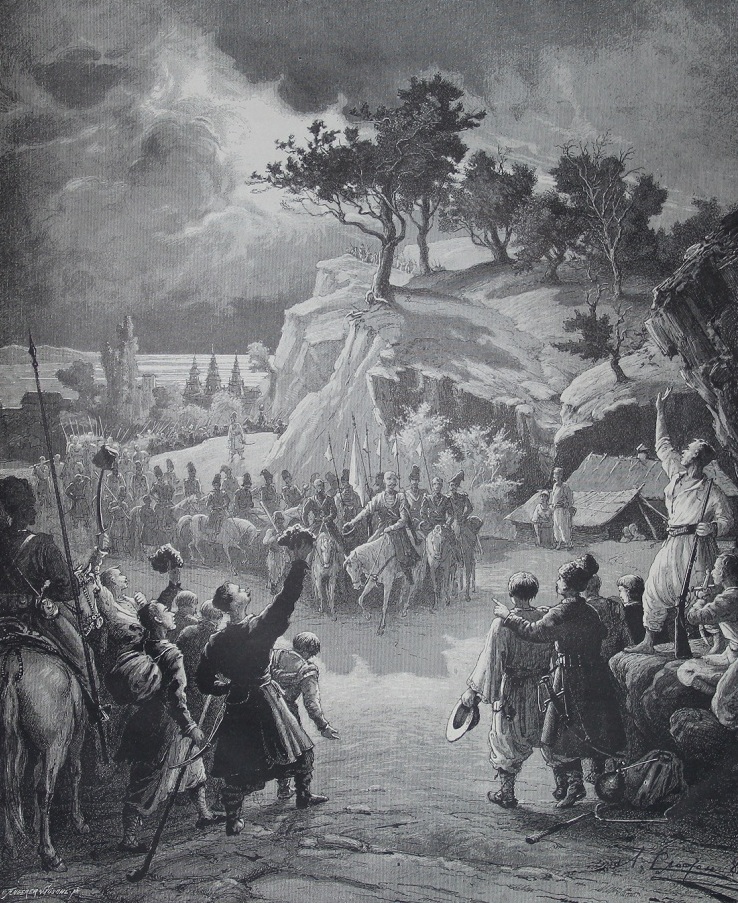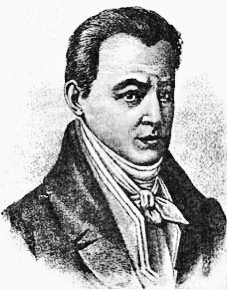|
Haydamaky (poem)
Haidamaki ( ua, Гайдамаки) is an epic poem by Taras Shevchenko about the Koliivshchyna led by Maksym Zalizniak and Ivan Gonta. The poem was written in about 1839–1841 and first published in full as a separate book in Saint Petersburg in 1841. It is dedicated to his friend, artist, Vasyl Ivanovych Hryhorovych. See also * Izbornyk * Koliivshchyna (film) * List of Ukrainian-language poets * List of Ukrainian-language writers * Ukrainian literature Ukrainian literature is literature written in the Ukrainian language. Ukrainian literature mostly developed under foreign domination over Ukrainian territories, foreign rule by the Polish–Lithuanian Commonwealth, Poland, the Russian Empire, t ... References External linksTranslation by John Weir Ukrainian literature Taras Shevchenko Ukrainian-language books 1841 poems {{Ukraine-stub ... [...More Info...] [...Related Items...] OR: [Wikipedia] [Google] [Baidu] |
Taras Shevchenko
Taras Hryhorovych Shevchenko ( uk, Тарас Григорович Шевченко , pronounced without the middle name; – ), also known as Kobzar Taras, or simply Kobzar (a kobzar is a bard in Ukrainian culture), was a Ukraine, Ukrainian poet, writer, artist, public and political figure, folklore, folklorist and ethnography, ethnographer.Taras Shevchenko in the Great Soviet Encyclopedia, 3rd Edition. 1970-1979 (in English) His literary heritage is regarded to be the foundation of modern Ukrainian literature and, to a large extent, the modern Ukrainian language, though this is different from the language of his poems. He also wrote some works in Russian (nine novellas, a diary, and an autobiography). Shevchenko is also known for his many masterpieces as a painter and an illustrator. [...More Info...] [...Related Items...] OR: [Wikipedia] [Google] [Baidu] |
Koliivshchyna
The Koliivshchyna ( uk, Коліївщина, pl, koliszczyzna) was a major haidamaky rebellion that broke out in Right-bank Ukraine in June 1768, caused by money (Dutch ducats coined in Saint Petersburg) sent by Russia to Ukraine to pay for the locals fighting the Bar Confederation , the dissatisfaction of the peasants with the treatment of Eastern Catholics and Orthodox Christians by the Bar Confederation and the threat of serfdom and the opposition to the nobility and the Poles by the Cossacks and the peasants. The uprising was accompanied by violence against the members and supporters of the Bar Confederation, Poles, Jews and Roman Catholics and especially Uniate clergymen and culminated in the massacre of Uman. The number of victims is estimated from 100,000 to 200,000, because many communities of national minorities (such as Old Believers, Armenians, Moslems and Greeks) completely disappeared in the area of the uprising. Etymology The origin of the word is not certain. Ta ... [...More Info...] [...Related Items...] OR: [Wikipedia] [Google] [Baidu] |
Maksym Zalizniak
Maksym Zalizniak ( uk, Максим Залізняк, Maksym Zaliznyak) (born early 1740s in Medvedivka near Chyhyryn - date and place of death unknown, after 1768) was a Ukrainian Cossack and leader of the Koliivshchyna rebellion. History Zaliznyak was born in a poor peasant family of Orthodox Christians in the Crown land in Polish Right-bank Ukraine about 1740. At a very young age he joined the Zaporozhian Host of Sich in 1753 as an agricultural employee, then a fishery one. By 1767 he had retired both from Sich and his canteen trade and became a lay brother at near Chyhyryn. He learnt that there was a lot of Russian money (false Dutch ducats) in the monastery and in many parts of Ukraine to fund an uprising against Bar confederation. Witnessing Bar confederation oppression of Ukrainian peasants in right-bank Ukraine Zaliznyak decided to divide ducats among rank-and-file Ukrainians, left the monastery and led an uprising of over 1,000 cossacks and of many others througho ... [...More Info...] [...Related Items...] OR: [Wikipedia] [Google] [Baidu] |
Ivan Gonta
Ivan Gonta (; died 1768) was one of the leaders of the Koliivshchyna, an armed rebellion of peasants and Ukrainian Cossacks against Bar confederation in the Polish–Lithuanian Commonwealth. Born in Rożyszki (modern Rozsishky) near Uman' in Bracław Voivodship, Gonta served as a sotnik (captain) of Cossack household militia of Franciszek Salezy Potocki, the Voivode of Kiev, and commanded a small unit in the garrison of Uman since 1757. During the Koliivshchyna he was ordered to fight the approaching haidamaka forces of Maksym Zalizniak. Instead, he and his militia joined the rebels, and the joint forces captured and ravaged the town of Uman on June 21, 1768. In what became known as the Massacre of Uman, thousands of local Polish szlachta, Jews, Uniates and other people were slaughtered. After that, Gonta was proclaimed colonel and commanded the garrison of Uman. When Gonta sent a detachment to spread rebellion into the Ottoman Empire, Catherine the Great, the Empress of Russia ... [...More Info...] [...Related Items...] OR: [Wikipedia] [Google] [Baidu] |
Saint Petersburg
Saint Petersburg ( rus, links=no, Санкт-Петербург, a=Ru-Sankt Peterburg Leningrad Petrograd Piter.ogg, r=Sankt-Peterburg, p=ˈsankt pʲɪtʲɪrˈburk), formerly known as Petrograd (1914–1924) and later Leningrad (1924–1991), is the second-largest city in Russia. It is situated on the Neva River, at the head of the Gulf of Finland on the Baltic Sea, with a population of roughly 5.4 million residents. Saint Petersburg is the fourth-most populous city in Europe after Istanbul, Moscow and London, the most populous city on the Baltic Sea, and the world's northernmost city of more than 1 million residents. As Russia's Imperial capital, and a historically strategic port, it is governed as a federal city. The city was founded by Tsar Peter the Great on 27 May 1703 on the site of a captured Swedish fortress, and was named after apostle Saint Peter. In Russia, Saint Petersburg is historically and culturally associated with t ... [...More Info...] [...Related Items...] OR: [Wikipedia] [Google] [Baidu] |
Izbornyk
Izbornyk is an internet-library project of the old Ukrainian literature also known as "History of Ukraine 9-18th centuries. Primary sources and interpretation". It functions since the 21st of August 2001. The project is a collection of major works on history of Ruthenia, Cossack Hetmanate and Ukraine. The project covers the following main subjects: Chronicles, Linguistics, History, Old Ukrainian Literature, Taras Shevchenko, Political Science, Literary Studies, Grammar and lexicons, Historical maps. 2016, according to website visit statistics, there are from 200,000 to 500,000 visitors per month. Idea A library is a collection of ebooks and texts, combined with a declared theme and a single idea. The idea behind the project is to strive to collect as many works of Ukrainian writing as possible, not simply as a random collection of texts from different times and authors, but against the backdrop of a holistic cultural and historical process, which would make it clear the unity, ... [...More Info...] [...Related Items...] OR: [Wikipedia] [Google] [Baidu] |
Koliivshchyna (film)
The Koliivshchyna ( uk, Коліївщина; pl, koliszczyzna) was a major haidamaky rebellion that broke out in Right-bank Ukraine in June 1768, caused by the dissatisfaction of peasants with the treatment of Orthodox Christians by the Bar Confederation and serfdom, as well as by hostility of Cossacks and peasants to the local Polonized Ruthenian nobility and ethnic Poles. The uprising was accompanied by pogroms against both real and imagined supporters of the Bar Confederation, particularly ethnic Poles, Jews, Roman Catholics, and especially Byzantine Catholic priests and lairy. This culminated in the massacre of Uman. The number of victims is estimated from 100,000 to 200,000. Many communities of national minorities (such as Old Believers, Armenians, Muslims and Greeks) completely disappeared in the areas devastated by the uprising. Etymology The origin of the word "Koliivshchyna" is not certain. Taras Shevchenko, whose grandfather had participated in the uprising, wrot ... [...More Info...] [...Related Items...] OR: [Wikipedia] [Google] [Baidu] |
List Of Ukrainian-language Poets
The following is a list of Ukrainian-language poets. 18th century *Hryhori Skovoroda – Kharkiv Oblast 19th century *Taras Shevchenko – Zvenyhorodsky Raion, Cherkasy Oblast *Ivan Franko – Yavorivskyi Raion, Lviv Oblast * Leonid Hlibov – Khorolskyi Raion, Poltava Oblast *Yevhen Hrebinka – Ubizhyshche, (today – Marianivka), Poltava Governorate * Levko Borovykovsky – Myliushky, Poltava Governorate *Ivan Vahylevych – village of Yasen (today in Kalush Raion), Stanisławów Powiat, Kingdom of Galicia and Lodomeria *Markiyan Shashkevych – Pidlyssia, Złoczów Powiat, Kingdom of Galicia and Lodomeria *Panteleimon Kulish – Voronizh (now in Sumy Oblast) *Yuriy Fedkovych – Putyla (now in Chernivtsi Oblast) *Pavlo Chubynsky – village Hora, Pereyaslav county, Poltava Governorate 20th century *Mykola Khvylovy – Trostianets, Sumy Oblast *Olena Teliha – Moscow, Russia *Pavlo Tychyna – Chernihiv Oblast * Lesya Ukrainka – Zviahel, Zhytomyr Ob ... [...More Info...] [...Related Items...] OR: [Wikipedia] [Google] [Baidu] |
List Of Ukrainian-language Writers
This is a list of authors who have written works of prose and poetry in the Ukrainian language. A *Nikolai Amosov (1913–2002), novelist, essayist, and medical writer * Emma Andijewska (born 1931), novelist, poet, and short story writer * Nadija Hordijenko Andrianova (1921–1998), journalist, translator, and biographer * Sofia Andrukhovych (born 1982), novelist, translator, and editor * Yuri Andrukhovych (born 1960), novelist, poet, short story writer, essayist, and translator * Bohdan Ihor Antonych (1909–1937), poet, translator, and editor B *Ivan Bahrianyi (1906–1963), poet, novelist, and essayist * Mykola Bakay (1931–1998), poet, and songwriter * Vasyl Barka (1908–2003), poet, writer, literary critic, and translator * Volodymyr Ivanovych Barvinok (1879–1943), historian, theologian, and bibliographer *Mykola Bazhan (1904–1983), poet, editor, and translator * Natalia Belchenko (born 1973), poet and translator * Nina Bichuya (born 1937), novelist, and children's wr ... [...More Info...] [...Related Items...] OR: [Wikipedia] [Google] [Baidu] |
Ukrainian Literature
Ukrainian literature is literature written in the Ukrainian language. Ukrainian literature mostly developed under foreign domination over Ukrainian territories, foreign rule by the Polish–Lithuanian Commonwealth, Poland, the Russian Empire, the Kingdom of Romania, the Austria-Hungary Empire, and the Ottoman Empire, enriched Ukrainian culture and language, and Ukrainian authors were able to produce a rich literary heritage. Ukrainian literature’s precursor: writings in Old-Church Slavonic and Latin in Ukraine Prior to the establishment of Ukrainian literature in 1700s, many authors from Ukraine wrote in "scholarly" languages of middle-ages – Latin and Old-Church Slavonic. Among prominent authors from Ukraine who wrote in Latin and Old-Church Slavonic are Hryhorii Skovoroda, Yuriy Drohobych, Stanislav Orikhovsky-Roxolan, Feofan Prokopovych, , and others. The beginnings of oral Ukrainian literature During this period of history there was a higher number of elementa ... [...More Info...] [...Related Items...] OR: [Wikipedia] [Google] [Baidu] |
Ukrainian-language Books
Ukrainian ( uk, украї́нська мо́ва, translit=ukrainska mova, label=native name, ) is an East Slavic language of the Indo-European language family. It is the native language of about 40 million people and the official state language of Ukraine in Eastern Europe. Written Ukrainian uses the Ukrainian alphabet, a variant of the Cyrillic script. The standard Ukrainian language is regulated by the National Academy of Sciences of Ukraine (NANU; particularly by its Institute for the Ukrainian Language), the Ukrainian language-information fund, and Potebnia Institute of Linguistics. Comparisons are often drawn to Russian, a prominent Slavic language, but there is more mutual intelligibility with Belarusian,Alexander M. Schenker. 1993. "Proto-Slavonic," ''The Slavonic Languages''. (Routledge). pp. 60–121. p. 60: " hedistinction between dialect and language being blurred, there can be no unanimity on this issue in all instances..."C.F. Voegelin and F.M. Voegelin. 19 ... [...More Info...] [...Related Items...] OR: [Wikipedia] [Google] [Baidu] |




